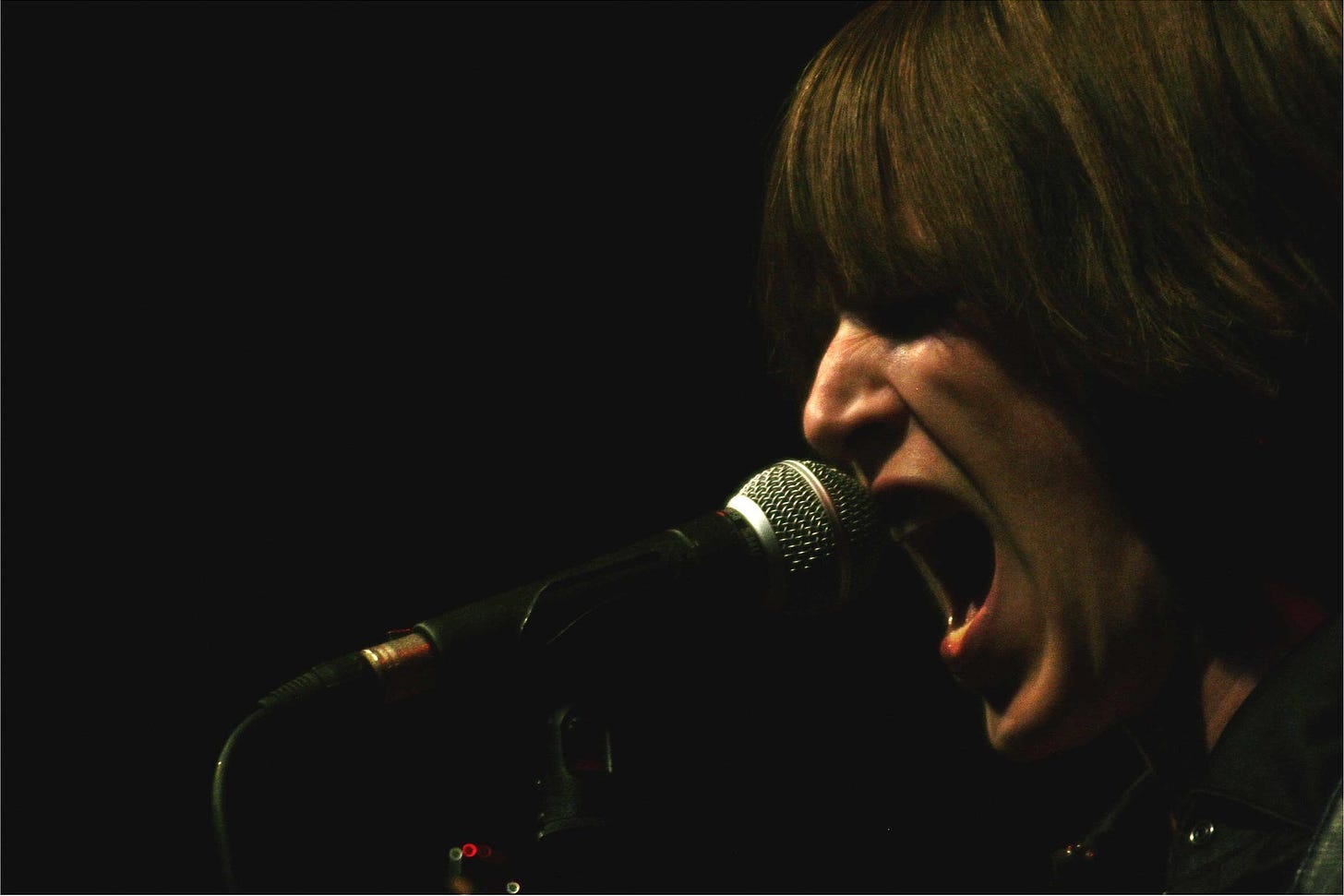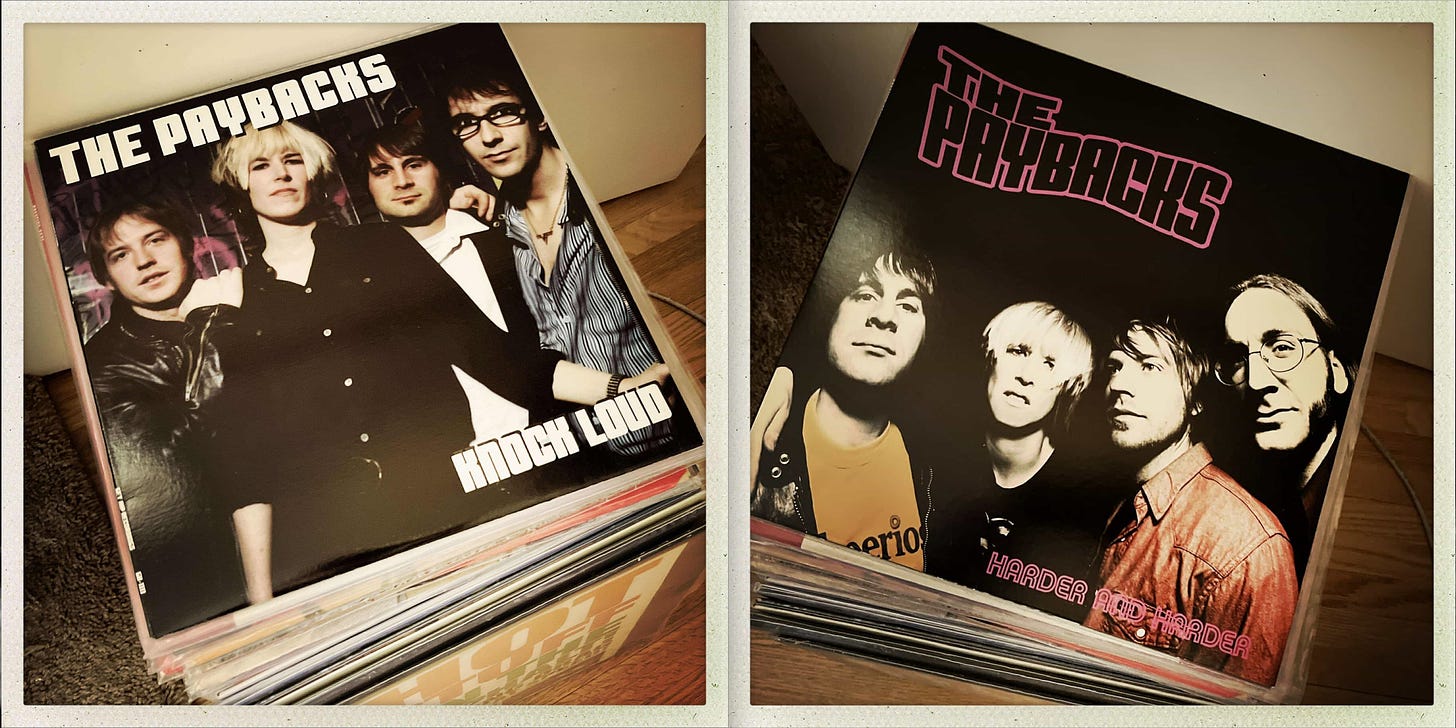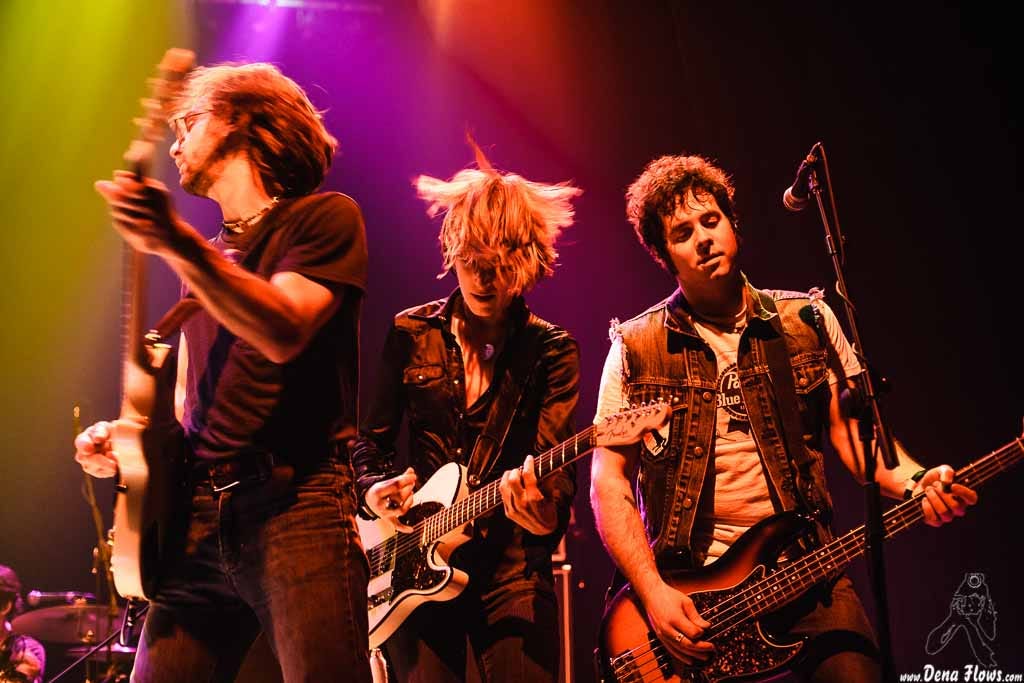When I'm in chaos
Wendy Case and the Paybacks find hard truths in uncompromising rock and roll
Having migrated my old blog over to Substack, I’ll be periodically revisiting, and revising, some older pieces that some of my new readers may have missed. This originally went live in the Fall of 2021.
For a recent road trip from Illinois to Maryland and back I put together a 740+ song playlist of Detroit and Detroit-area rock and roll. The Paybacks’ three superb albums—Knock Loud (2002), Harder And Harder (2004), and Love, Not Reason (2006)—were on there, of course, and muscled their way up through shuffle-play with ferocious tenacity. I fell in deeper love with Wendy Case’s songs on that trip.
The Paybacks were one of the great rock and roll bands of the aughts. Three of their tracks in particular, “If I Fell” and “Hot Shot” from the band’s debut Knock Loud and “Can You Drive” from Harder And Harder, struck me again with their powerful blend of swagger and vulnerability, a poignant, paradoxical itch that Case excels in scratching. Much has been written about Case’s extraordinary voice, which can travel the long road from hoarse and raw to honeyed and nuanced, sometimes in the same line. A powerful, explosive singer, she can howl like a guitar cranked through an overdriven amp, the rawness of it all especially moving when she’s singing about emotional spaces where she’s been left surprised and unguarded, and then croon as is that very sparking current was a balm all along.
“If I Fell,” co-written by Case and founding guitarist Marco Delicato, sets the stakes: if I fall for you, will you fall for me? A hedge against lowered defenses. That’s the game, and the guy she’s singing to is firmly in her sights, and possibly up for it. She persuades him that though this is dangerous stuff, it’s worth it to be singed rather than duck for cover. “Say my name,” she sings to him in the song’s hottest line, “you’re gonna do it anyway.” She knows he wants to try it, but he ain’t convinced yet, so she offers:
Love is like strip poker,
and you never know what cards you’re going to draw
until you get it, and you might live to regret it,
but it’s better not to fight the only game you can never win
Who knows if her amped seduction works as last call arrives, but to my ears it would seem awfully hard for him to resist, given the singer’s sexy playfulness, her cajoling insistence that he must want her too, and her willingness to fall right along with him. Jim Diamond produced half of Knock Loud, Steve King the other half, and the band—joining Case on guitar are Delicato on guitar, John Szymanski on bass, and Mike Latulippe on drums—provide the raw, pummeling soundtrack, the sonic wingman, to Case's winking pitch.
Case had a raucous past, and she’s been honest about her drug and alcohol abuse. Asked in an interview with The Center for Punk Arts about lessons learned from her early rough days, Case responded, “Well... let’s see...”
I learned how to run scrips on Chinese pharmacies, I learned how to break into a hotel room with a knife or a laminated bus pass and I learned how to tell when you are under surveillance by the man. I learned how to shimmy down drainpipes and fire escapes and I learned that jail sucks.
What did those years mean to her musically? “Not much,” she admitted. “I didn’t start writing good music ’til I stopped doing drugs.”
The astonishing “Can You Drive” (another co-write with Delicato) sounds like a missive from those days, a desperate song about the limits of friendship, and how those limits can be tested under the duress of need. Here, the truths feel harder-won than on the edgy if comparatively upbeat “If I Fell.” The singer’s had a few beers and she needs a place to crash, so she asks him for help. They can walk. Or can he drive? “I’m just keeping it alive,” she confesses to him.
That it is the song’s mysterious center—the night? her high? her life?—and Case sings as if she needs the song to keep moving forward, or else. The scenario I see: he’s a got a girlfriend, but she could care less; she doesn’t want to hear that noise, she came to play with the boys: she just needs a ride, the one thing that will keep it alive. In the song’s middle—it feels like we’re in the car with them now—things get gentler, and Case’s vocals are just a marvel: shrugging in her beer, she sings that she thinks he’ll do alright, whether that means getting her safely to wherever they’re going, or something else, it’s unclear, until the next line, where within a sliver of vulnerable candor in the dim interior light she admits that he looks good in the night.
The way she sings the word “night,” beginning with a growl and ending with a soft vibrato, is everything that’s sensational about Wendy Case. Her band on this track (Syzmanski and Latulippe again, with recently departed Delicato returning to pitch in on guitar) knows enough to dial back the decibel levels and let Case work her way through the surprise on that ride. “In the night,” she repeats again and again—before a powerful guitar solo takes the song to its end—while looking through that windshield, blurry with drink, aroused by the circumstances, at something maybe unexpected.
A terrific song, one of Case’s best. Fifteen years ago she spoke to Beer Melodies about songwriting. “The best ones happen in a rush in about five minutes,” she said. “Lyrics and music come together at once. It’s pretty awesome when that happens.” She added,
I just wish it happened all the time. Sometimes I’ll start with nothing but a song title and build on that. I only really write anything decent when I’m in chaos. So I wait around for the other shoe to drop ‘cause when I’m happy I write … cute happy songs. There’s got to be genuine passion.
In Case’s hands, backed by her extraordinary band, the desperate passion in “If I Fell” and “Can You Drive” is as genuine as that often overwhelming feeling can get in rock and roll. Turn it up and learn something.
The perpetual motion machine of “Hot Shot,” meanwhile, begins in high gear and stays there for the duration. (Eternal stuff. A DNA test of the song would likely reveal the Wailers’ “Hang Up” and the Del-Vetts’ “Last Time Around” imprinted in its genealogy.) Case cackles maniacally five bars in, gleeful and brave as she hugs the neck of this galloping, sexy tune, which Delicato wrote. Again the singer, really, couldn’t be clearer:
I want you, you know that I do
Come here sweet thing now, we’re gonna do it times two
I need you like nobody else
You do the things baby I couldn’t do by myself
Later she promises them a ride, and the song roars with approval—the song is that ride, really, or the best advertisement for one that you could hope for. I need you, right here by my side, she sings, Bring it on baby, I'm gonna give you your shot. Delicato’s guitar playing, over the ferocious opening bars and in his Ace Frehley-inspired solos, nearly trash the joint; it’s credit to the band, the producer, and whoever built the studio that the whole thing doesn’t come crashing down. Detroit tough, Case sings with such fun and abandon that destruction, actually, sounds like a blast.
After I published the original version of this piece in 2021, Case responded in a Facebook post. She helpfully corrected me on a couple of things, which I’ve fixed here, and about co-writing songs with Delicato she remarked, “Normally, I’m not much for collaboration—but his talent for great riffs was irresistible and resulted in some of our most memorable recordings.”
She also offered offered a terrific gloss on “Can You Drive,” a song about which, it turns out, I was mostly right: the tune, Case wrote, was about “scanning the room for viable post-2 a.m. ‘experiences.’ The party was never over in those days, but you wanted to be careful not to lower your standards TOO much.” She added, “The lyrics are instructional more than anything—and usually got the job done.” Great stuff. Case hadn’t been able to tag me in her post, but providentially (or inevitably, given Facebook’s algorithms) it showed up on my wall, and I was very happy to see it. She thanked me for “keeping the faith,” adding “And, as always, love to all my PBs mates.”
In a passage in Steve Miller’s oral history Detroit Rock City: The Uncensored History of Rock ‘n’ Roll in America’s Loudest City Jim Diamond observed his city’s early and mid aughts “Neo Garage” phase from some distance. “There were people from England coming [to Detroit], interviewing us,” he said. “I never thought anything of it at the time. I was just doing my job; I'm like, ‘This is great.’ More bands are coming through. I’m getting people from out of town. This is good. I never thought anything of it, like, ‘Oh my God, these are special times’.”
Diamond remembered when Gregg Kostelich of the Get Hip record label arrived in town to talk with the Paybacks. (In the event, the label would put out Knock Loud and Harder and Harder.) “Greg told me later that it seemed to him like some people were getting big heads and talking like they were going to explode like Seattle and all this shit,” Diamond said. “He told me later he thought it was kind of ‘Eh, don’t let your heads get too big,’ It might not happen like you’re envisioning. And lo and behold, it didn’t.”
Some bands, like some songs, never go away. The tuneful roar of the Paybacks’ best material remains undiminished. In response to a comment I’d written in my original post about the Paybacks having called it quits after 2006’s Love, Not Reason, Case made the point that the band “very purposefully, never broke up. I loathe ‘reunion’ shows and never wanted to be accused of such—so we just stayed together in a very lazy way. We usually make it out of the house about twice a year.” That, I was happy to read. There’s plenty of evidence of the Paybacks’ onstage righteousness, and I hope one day, still, to see them.
Top photo of Wendy Case by disgustipado at Flickr via Creative Commons
Bottom photo of the Paybacks at Kafe Antzokia, Bilbao, 12/1/2007 by Dena Flows via Creative Commons






Wait ... But ... BRIGHT SIDE is my favorite Paybacks song!